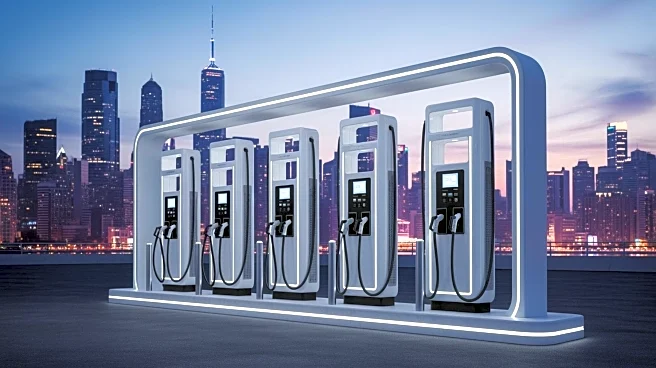What's Happening?
Kia has announced the global rollout of its new electric vehicle, the EV5, set to begin in the second half of 2025. The rollout will start in Korea and Europe, with sales in Canada following in early 2026.
Notably, the press release did not mention plans for the U.S. market, raising questions about whether the EV5 will be available in the United States. This comes at a time when the U.S. federal government is perceived as hostile to electric vehicles, with tariffs impacting the market and other automakers scaling back their EV plans. The EV5 is a mid-sized SUV, available in two-wheel and four-wheel drive variants, featuring an 81 kWh battery with a range of 323-329 miles on a full charge. Kia's President and CEO, Ho Sung Song, emphasized the EV5's appeal to millennials and young families, highlighting its comfort and advanced connectivity.
Why It's Important?
The potential exclusion of the U.S. market from Kia's EV5 rollout could have significant implications for the electric vehicle industry in the country. The EV5 is positioned as a mass-market offering that could drive substantial sales, appealing to a demographic that values both practicality and modern design. If Kia decides not to introduce the EV5 in the U.S., it could miss out on tapping into a growing market for electric SUVs, which are increasingly popular among American consumers. This decision could also reflect broader challenges faced by automakers in navigating U.S. policies and tariffs that may deter foreign EV manufacturers from entering the market. The absence of the EV5 in the U.S. could slow the shift towards electrified mobility, impacting consumer choice and the pace of EV adoption.
What's Next?
Kia's decision regarding the U.S. market remains uncertain, and stakeholders are likely to watch closely for any updates or changes in strategy. If Kia opts to introduce the EV5 in the U.S., it will need to address potential barriers such as tariffs and government policies that may affect its market entry. Additionally, Kia would need to ramp up marketing efforts to boost demand and production capacity for the EV5. The company's approach to expanding its EV customer base and accelerating the shift towards electrified mobility will be critical in determining the success of the EV5 in the U.S. market.
Beyond the Headlines
The potential exclusion of the EV5 from the U.S. market highlights broader issues in international trade and environmental policy. It underscores the impact of government actions on the automotive industry and the challenges faced by companies in adapting to regulatory environments. The situation also raises questions about the future of global EV strategies and the role of international cooperation in promoting sustainable transportation solutions.









